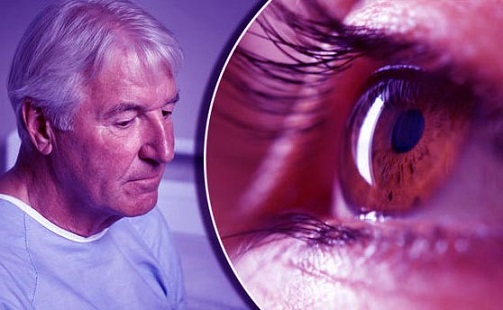Pseudoexfoliative glaucoma associated with increased risk of developing vascular dementia
Nikhil Prasad Fact checked by:Thailand Medical News Team Jul 20, 2024 1 year, 6 months, 3 weeks, 6 days, 3 hours, 29 minutes ago
Medical News: A groundbreaking study has unveiled intriguing associations between different types of open-angle glaucoma (OAG) and dementia among Medicare beneficiaries in California. Researchers from renowned institutions have conducted an in-depth analysis, revealing that certain types of glaucoma might be linked to a decreased risk of dementia, while others show a potential increased risk. This
Medical News report delves into the study's findings and their implications for medical practice and future research.
 Pseudoexfoliative glaucoma associated with increased risk of developing vascular dementia
The Study and Its Scope
Pseudoexfoliative glaucoma associated with increased risk of developing vascular dementia
The Study and Its Scope
A team of researchers, including Nikolaos Topouzis from Aristotle University of Thessaloniki-Greece, Ken Kitayama, Allan Puran, Fei Yu, Victoria Tseng, and Anne L. Coleman from the University of California, Los Angeles-USA, embarked on an extensive investigation to examine the relationship between OAG and dementia in 2019 California Medicare beneficiaries.
Key Findings
Different Types of Glaucoma Examined
The study categorized open-angle glaucoma into four subtypes:
-Primary Open-Angle Glaucoma (POAG): The most common type, characterized by the gradual clogging of the drainage canals, resulting in increased eye pressure.
-Normal Tension Glaucoma (NTG): A form of glaucoma where optic nerve damage occurs despite normal eye pressure.
-Pseudoexfoliative Glaucoma (PXG): Caused by the accumulation of microscopic flakes of extracellular material in the drainage angle of the eye.
-Pigmentary Glaucoma (PG): Results from pigment granules flaking off from the iris and clogging the eye's drainage system.
Dementia Types Investigated
The researchers also focused on various forms of dementia, including:
-Alzheimer's Dementia (AD): The most common type of dementia, characterized by memory loss, confusion, and cognitive decline.
-Vascular Dementia (VD): Caused by reduced blood flow to the brain, often following a stroke or series of strokes.
-Lewy Body Dementia (LBD): Involves abnormal protein deposits called Lewy bodies that affect brain function.
-Frontotemporal Dementia (FTD): Affects the frontal and temporal lobes of the brain, leading to changes in personality, behavior, and language.
Prevalence and Associations
Overall Findings
Among the 2,431,150 Medicare beneficiaries studied, 4.3% had POAG, 0.4% had NTG, 0.2% had PXG, and 0.05% had PG. The overall prevalence of any dementia w
as 3.2%.
Interestingly, the study found that the odds of any dementia were lower for beneficiaries with all OAG subtypes compared to those without glaucoma. For instance, POAG and PXG patients had a 26% lower likelihood of developing dementia, while NTG and PG patients had a 40% and 62% lower likelihood, respectively.
Age-Stratified Analysis
The study revealed age-specific associations between glaucoma and dementia:
Younger Beneficiaries (65-74 years):
-PXG: Increased odds of vascular dementia (VD) were found in younger beneficiaries with PXG.
-Other OAG Types: No significant association with dementia types was noted in this age group.
Older Beneficiaries (75-84 years and 85+ years):
-PXG and POAG: Both types were associated with decreased odds of any dementia and Alzheimer's dementia.
-NTG: Associated with decreased odds of any dementia across all age groups.
Possible Explanations
The study suggests several potential explanations for these findings:
-Selection Bias: Older adults who continue to follow up with glaucoma care may be more cognitively intact. Regular visits to ophthalmologists could indicate better overall health management and cognitive function.
-Biological Mechanisms: There might be protective factors related to glaucoma treatments or specific biological pathways involved in glaucoma that also protect against dementia. For example, some glaucoma medications have neuroprotective properties that might benefit brain health.
-Healthcare Access: Differences in healthcare access and utilization among individuals with and without glaucoma may also play a role. Those who are diligent about managing their glaucoma might also be more proactive in managing other health conditions, including cognitive health.
Implications for Future Research
These findings open new avenues for research into the complex relationship between glaucoma and dementia. Future studies could explore:
-Biological Pathways: Investigating the specific biological mechanisms that may link glaucoma and dementia, such as the role of the translaminar pressure gradient in the development of neurofibrillary plaques in Alzheimer's disease.
-Healthcare Utilization: Understanding how access to and utilization of healthcare services impact these associations. This includes looking at how often patients with glaucoma are screened for cognitive decline and vice versa.
-Preventive Strategies: Developing strategies to prevent both glaucoma and dementia, potentially benefiting overall brain and eye health. This might involve regular screenings and early interventions for at-risk populations.
Conclusion
The research conducted by Topouzis, Kitayama, Puran, Yu, Tseng, and Coleman provides valuable insights into the relationship between open-angle glaucoma and dementia. While the study suggests that certain types of glaucoma may be associated with a lower likelihood of dementia, it also highlights the need for further investigation to fully understand these associations.
The study findings were published in the peer-reviewed American Journal of Ophthalmology.
https://www.sciencedirect.com/science/article/pii/S0002939424003088
For the latest on Glaucoma and Dementia, keep on logging to Thailand
Medical News.
Read Also:
https://www.thailandmedical.news/news/baking-soda-rescues-retinal-ganglion-cells-and-ameliorates-visual-dysfunction-caused-by-oxidative-stress-even-in-glaucoma
https://www.thailandmedical.news/news/how-zinc-and-carnosine-could-hold-the-key-to-fighting-dementia-and-parkinson-s-disease
